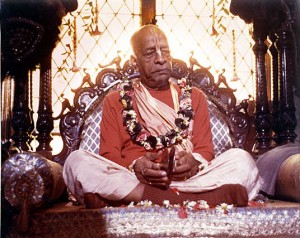
Srila Prabhupada at the Bahulaban Temple
Srila Prabhupada Visits New Vrindaban – June 22nd, 1976.
Excerpt from Hari Sauri’s Trancendental Diary.
New Vrindaban is spread out over a large area, and each section is called by a different name corresponding to the twelve different forests or vanas, of the original Vrndavana. Prabhupada took his morning walk along a dirt road in Talaban. The vale we walked in was a little dank and dark due to dense vegetation. A heavy mist hung low all across the valleys, but our immediate area was clear. Kirtanananda Swami pointed out various parcels of land which are becoming available. Glorifying the simple country life, Srila Prabhupada encouraged him to buy as much as possible.
The devotees are growing hay on land rented from neighbors and this is stored in silos for the cows’ winter feed. Kirtanananda Maharaja explained that they give only a third, or sometimes even just a quarter, of the produce in exchange for using the land. The neighbors would rather have this arrangement than leave the land untended because regular usage prevents trees from growing, which would ruin it. He told Prabhupada that they are also now cutting their own lumber.
Prabhupada liked that. “That is the nature’s way. You cut the lumber and make cottage, and the land is clear, then cultivate, get your food, and cows, give them grass.”
As we walked past some dogs on the roadside they began to bark. “Immigration department!” Prabhupada joked. “We have got passport! That’s all right.” He chuckled. “Dog’s business. Without any fault, they’ll chastize. We have no fault, still they are chastizing.”
Kirtanananda said that although there is so much unused land, the government still says there is overpopulation.
Srila Prabhupada said that he has never accepted this assertion. “There is no overpopulation. If the Americans allow the Chinese and the Indians to come, they can develop all these. ‘No, this is our land, you cannot come.’ Immigration — gow gow! In Bhagavatam we see that when Nanda Maharaja felt some disturbances from the demons, they decided to change the place. And they immediately, from Gokula, they immediately went to Vrndavana. But we don’t find anything that they had to take permission. So that means formerly this was the system. If there is any vacant land, one can go and live there. There’s no question of permission. When you live there and you make your professional activities, then the king will come, take little tax.”
Kirtanananda said that was formerly the system in America. “They called it ‘homesteaders.’ If you would go and make your home there, you could have the land.”
“That is not for the foreigners,” Prabhupada said. “If some Chinese men or Indian want to come …”
Kirtanananda Maharaja replied that foreigners used to be allowed, but now they don’t allow anyone.
“Just see,” Prabhupada said. “Why?”
“Because it has become very profitable for people to keep it. Because people are making money on it now.”
“Money they must make,” Prabhupada granted, “otherwise, why they should come? But what is the objection? Just like in the marketplace, still, in India, the system is, the marketplace, anyone can go and sell his goods, and when he’s selling, the proprietor takes some contribution. Not that he has to take permission. He’s selling there, that’s all right, ‘Give me some, a little contribution.’ The king has the right to tax for maintenance.”
As we drove back to the temple for darsana of the Deities and class, Kirtanananda Swami pointed out different patches of land where the devotees are growing a big variety of vegetables — cauliflower, peas, beets, carrots, lettuce, spinach, potato, broccoli, cabbage and peppers. But he said that most of them are not yet fructified because this is early in the season.
Prabhupada was well satisfied that the devotees are working the land. He has said many times he wants us to learn how to be self-sufficient, gaining all our needs from the land. “Vegetables, ghee, milk, wheat, then what do you want more?” he asked. “We can grow all these things and eat very nicely. Where is economic problem?”
* * *
After greeting Sri Sri Radha-Vrndavanacandra, Who were bedecked with the natural opulence of fresh wild flowers from the patures, Srila Prabhupada received guru-puja. The temple room was packed, with a large contingent of young, saffron-clad gurukula boys all crowded around the front of the vyasasana. The sun was just coming up and its strengthening rays shone through the window behind Srila Prabhupada, highlighting His Divine Grace in a splendorous orange-gold effulgence. Prabhupada played the gong and the devotees jumped and shouted excitedly when he threw flowers high into the air and over their heads.
After singing Jaya radha-madhava, Prabhupada spoke on Srimad-Bhagavatam 7.6.6. Prahlada Maharaja makes the calculation in this verse that out of one hundred years duration of his human form, a person who cannot control his senses only has fifty years. This is because he sleeps twelve hours per day due to ignorance, and he thereby loses this time for the real business of spiritual development.
Noting the good fortune of the young brahmacaris at his feet in beginning their devotional service at the start of their lives, Prabhupada explained that bhagavata-dharma means to keep always engaged in the service of the Lord, without a second’s loss. He listed the nine different items by which one can serve the Lord.
He especially focused on arcana, Deity worship. As he explained the value of it, he coupled it with a warning. “If you can contact Visnu or His devotee, Vaisnava, that is all right. Otherwise, you are simply wasting time. The Lord is called arca-vigraha. He is also incarnation. Another incarnation, arca-avatara. He’s giving facility to the devotees to handle Him. If you do not get the opportunity to serve the Lord, how you can be perfect? So this arca-vigraha is the Lord’s incarnation to give facilities to people like us who cannot see God everywhere. For the neophyte devotees, it is essential to worship the Deity. But if we simply worship the Deity without hearing about the Lord, sravanam kirtanam — these things are essential — then the Deity worship will be a burden. At a certain point, it will be a burden, and gradually it will be neglected, and the whole thing will be spoiled.
“So both things should continue: bhagavata-marga and pancaratriki-marga. Deity worship is pancaratriki-viddhi, and bhagavata-marga is hearing, chanting, like that. Both of them should be accepted, parallel line. Otherwise, one without the other will be later on troublesome. So you must continue. This temple means not only we shall decorate the Deity very nicely, cleanse the temple; at the same time, sravanam kirtanam of Visnu must go on. Two things, parallel. Then it will be done very nicely. So actually this life is meant for this purpose.”
Our experience in Kali-yuga shows that we do not even have one hundred years. Even then, he said, people are not serious about utilizing their time properly. “In our temple in New York, in the beginning when I was having classes in the morning at seven o’clock, still people from here and there they would come and protest and go to the police because we were disturbing their sleep. Yes. They want to sleep as much possible hours. I think that is very great gain in the Western country, to sleep.
“So to sleep means simply waste of time. You must know it. The valuable life which you have got, immediately so many hours minus. Sleep is not good. Sleep, if we can do without sleep, that is perfection. Not that let me enjoy sleep twelve hours, fourteen hours, whole life. No. That is waste of time.”
He cited the six Gosvamis of Vrndavana as examples of perfection in the use of time. “So we should be very, very careful not to waste the duration of life even by a second. We shall eat less, then we shall sleep also less. Nidrahara-viharakadi: then our sex appetite also will be less. Unnecessarily eating, unnecessarily sleeping is not required at all. That is the practice by the Gosvamis. They conquered over eating, sleeping. Mating, there was no question, they were sannyasis, renounced order of life, and defense also, there was no question because they depended on Krsna, the most powerful defender. Simply two things, eating and sleeping. And that they also conquered. So spiritual life means you have to control, that is called gosvami.”
He told us that this level of control is not possible to achieve by artificially supressing our senses, but can be had by attaining a higher spiritual taste. “There is another happiness. That is transcendental bliss. That we perceive a little bit while we are chanting. By chanting, chanting, chanting, when you’ll be purified, then you will have the opportunity of tasting that transcendental bliss. Otherwise, the so-called happiness derived from the senses, that is not happiness. That is crude, that is for the fools and rascals. That is not happiness. So we should utilize our time very carefully. You have taken to Krsna consciousness, take it a little more seriously and practice, follow the rules and regulations, chant regularly, then your life will be successful. Thank you very much.”
* * *
The day was quiet, and Prabhupada settled comfortably into the simple, but pleasant, house amid the fields and hills of West Virginia. It is a prefabricated structure, one of the better ones in the area, and is owned by Vana dasa and Hladini dasi who have vacated it to allow Srila Prabhupada its use. There are three bedrooms, a lounge and a kitchen. Prabhupada is using the largest of the bedrooms for his work and darsana area, and sleeps on a modest bed in another. The third is occupied by Pusta Krsna and myself, and Pradyumna and Raksana sleep downstairs in the large basement.
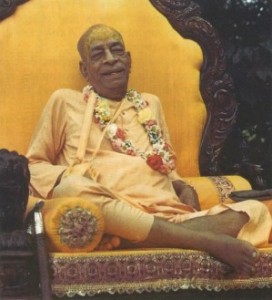
Srila Prabhupada seated on the yellow satin Vyasasan at Madhuban.
The house is furnished with more of the furniture from Bombay, which will eventually be placed in Prabhupada’s future home at Guruban — a marble-topped desk and matching asana, a large wardrobe with the figures of the ten principal incarnations of Lord Visnu carved in relief on the door panels, and a second large, raised vyasasana with a lion on either side and yellow satin upholstery. This seat has been placed on a large marble slab out in the garden for Prabhupada to sit on during the afternoon.
The one bathroom is reserved exclusively for Srila Prabhupada, although Pradyumna prabhu, who still has a gaping wound in his side, is also allowed its use. The rest of us bathe in the back yard from four feet high plastic barrels of water brought on the back of a truck by the devotees.
We pass stool in the fields. It is like being back in India, except West Virginia is not as warm.
There is a small lawn sheltered from the road by a row of trees and bushes, the foliage being just thick enough to afford complete privacy. Today Srila Prabhupada chose to have his noon massage outside, sitting in a shaded area of the garden.
Palika and Visakha prabhus are staying across the road in the Madhuban temple, a house which shelters what seems to be, at five-feet high, the biggest Jagannatha Deities in ISKCON. They will be taken to Cleveland tomorrow, one hundred and seventy miles away, to benedict the American public with their Ratha-yatra festival.
* * *
In mid-morning Pusta Krsna Swami presented Srila Prabhupada the mail. He was happy to get a long, detailed report from Harikesa Swami on the preaching in eastern Europe. At the time of writing, June 10th, he was in Koln, waiting to get a visa for Poland.
His letter commenced with a full page of glorification of Srila Prabhupada, comparing him to a famous Biblical figure. “You have become like Noah, who filled his ark with all kinds of living entities and saved them from the flood which engulfed the whole world, and then, as the story goes, when the deep seas subsided a little bit, created civilization again — so you have taken command of the modern day ark and are saving the most fortunate souls from this huge flood of material nescience and in your various centers you are recreating real civilization, although it seems to be an impossible task. You are the most worshipable personality amongst men, although you are not an ordinary man, but the leader of all men, the most perfect and supreme servitor of the Supreme Personality of Godhead.”
Harikesa, accompanied by Sumahat dasa, has been traveling extensively through England, Germany, France, Sweden and other European countries. They have formed a preaching team with two other devotees, Aksara dasa and Avinasacandra dasa. Ravanari dasa, an Arab devotee who speaks fluent German, is collecting to support their activities. He is also actively preaching behind the Iron Curtain.
Harikesa expects their team to be in Poland until June 24th, and then in Hungary from June 25th until July 5th. After that, they plan to attend the London Ratha-yatra, visit Greece for two weeks to meet up with the members of the Hungarian yoga club who will be on vacation there, and then come to visit Srila Prabhupada in France. After that, they have plans to visit Bulgaria.
He described some of their experiences preaching in the communist countries. In Yugoslavia, although it is not as hard-line as other eastern bloc states, the authorities warned them to leave Belgrade almost as soon as they arrived. They had several complications: a new bhakta they had taken along cracked under the pressure of their austere living (for two days they only ate roasted farina with salt) and went off on his own. When he returned they discovered he had been eating meat “which made him stink horribly,” and it became quite troublesome keeping him in order. Another problem was bad publicity generated the previous year by Lagudi dasa. A native Yugoslavian who joined our Movement in Australia,
Lagudi had returned to his home land in an attempt to preach. He held a press conference but because he is only semi-literate and cannot speak correctly, the press reported that followers of the Hare Krsna movement engage in human sacrifices and take drugs. Harikesa heard this from some people in Zagreb. Also, while in Zagreb Sumahat lost his passport, obliging them to remain for six extra days because everything was closed for the May Day parade and celebrations.
Despite these problems they took the offensive. “So we thought that what is there to lose, let’s go out on the street and distribute. So we did and after the first two people we were being watched by about 10 different authorities so we had to stop fast, but not before we had a few addresses to visit. At this point we were a little bold so we went to the center of town at the huge fountain and set up a book shop and started to sell books and records like anything. The police came but I started talking about how we were with the Sanskrit department at the University Indology department and how all the teachers were reading these books on Indian culture, etc. Somehow they were not so disturbed.”
After returning to the West, they traveled with the president of the Munich center, Prthu dasa, to East Berlin in the DDR. Although East Berlin is relatively easy to enter, no devotees had previously been there. The rest of the country is off limits to visitors. They stayed in an obligatory hotel, which was expensive, but they met with many interested people. “People are starving for Krsna. They have lists underground where one of our books will circulate all over the country, three days with each person, or sometimes over night, and the list is endless. One of our books is read thousands of times. So we smuggled in a whole large suitcase filled with Gitas, Bhagavatams, and records, and a few small books. These books are going like wildfire. We have devised a system for getting huge quantities into the country. To transit to W. Berlin is very easy and they do not check the auto. So one van went in by the entry with nothing in it. One van went in transit full. They met on a rest stop at night and changed suitcases, or if two identical vans are going one could change license plates and get a huge amount in at once. But we just changed the cases this time. We did home programs almost every night and many people are now very interested in Krsna consciousness. They love our records and play them constantly.”
He said that in the DDR, things are run in such a way that people are deliberately isolated and cannot meet together in groups. Fruits and vegetables are very scarce.
Harikesa mentioned that his health is still quite bad. He has not recovered since he left our party in February in Mayapur. A doctor told him he has a stone or blockage in the tube that makes bile go to the stomach. Yet somehow, while preaching, he said he forgets all this. “I can actually feel Krsna holding me up when I am out preaching.”
The biggest problem they face though, is lack of funds. Only Ravanari is collecting money, but he is due to go to Egypt and try to establish something there. Bhagavan dasa has promised help, but only in September, and most other centers are small and struggling with debts.
“Therefore I am wondering what to do. I will have to stop this program after the Poland and Hungary trips for there will be no more money.” Still, he said he was confident that if Krsna wants the program to go on the necessary support will come.
He requested advice on several points. He had an idea that, along with slide shows, a party of devotee actors and musicians could travel as an Indian Vedic Cultural Exhibition. He felt it would enable them to visit practically any country. It would be accepted as “nice wholesome and cultural entertainment” and they would legally be able to chant and distribute Indian snacks. He wanted to know if Prabhupada thought it worth the endeavor for them to organize it.
Ravanari has an idea to write bhakti commentaries verse for verse on the Koran — what he called The Vedic Koran. He said the book in its pure form is “rather Krsna conscious.” He also proposed to translate into Arabic the paper on communism that Harikesa wrote while he was still with Prabhupada early this year. Ravanari felt it would be well received in Egypt, where the president of the country is said to be looking for such material.
Finally Harikesa wanted to know if he should involve himself in smuggling books into the communist countries. He asked if Prabhupada felt this was foolish or necessary.
He then concluded with a prayer. “I am trying hard not to be a hypocritical sannyasi but I realize that I am a fool and I pray to your lotus feet for protection from the onslaughts of maya. I hope that you are well and your cook is good. I always have the feeling to come back with you at any moment, but I also want to be a good servant and do whatever is required. Simply always engage me in your service, I cannot remain sanatha jivitah but when will I simply be always satisfied to have such a good master? Please bless me with your causeless and boundless mercy.”
Although he kept his reply short and to the point, Srila Prabhupada was deeply satisfied to hear about their preaching efforts and the risks they have to undergo for both his and Krsna’s sake. He answered Harikesa’s questions point by point. “There is no need to give commentary on the Koran. There is no other religion in the world in truth than this Bhagavat-dharma. However, something is better than nothing. The communism book that you have written, they say that there are some words that may be irritating to the communists. We have just finished a book which Hayagriva is editing at present. It is called Dialectic Spiritualism and within that book, your comments can be added if need be for preaching in the Eastern European countries.
“Don’t try for Vaikuntha players, etc. in Eastern Europe at this time. It will make too much encumbrance and you may not be able to manage it.”
He also added a footnote about the publicity problems in Yugoslavia. “n.b. when there is such language difficulty as was found in Yugoslavia in that press interview, then we should not give interview. Stop all this bad practice. No interpretation. Otherwise what is the use?”
* * *
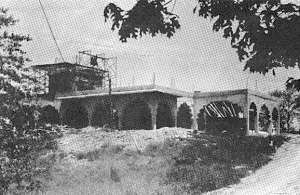
Srila Prabhupada’s Palace at Guruban, June 1976.
In the evening Prabhupada was taken on a tour of Gurubana, where the devotees are constructing a small “palace” for him. It is situated atop one of the highest hills for many miles around, affording a glorious, panoramic view of the surrounding West Virginian countryside.
Srila Prabhupada was impressed with their devotional efforts. With the transcendental vibration of the Krishna Consciousness Happening Album resonating in the background Prabhupada followed Kirtanananda Maharaja’s lead, carefully inspecting the entire work site. Most of the concrete work is done, and the finishing work started. There is a central hall, big enough to hold lectures in, with a small Deity room at the end.
Down each side are rooms for Srila Prabhupada and his servants. A dome at one end will be capped with a lotus flower shaped peak and reach twelve feet above the roof. Plastering work is about to begin and already some beautiful marble inlay has been fitted in what will be Prabhupada’s sitting room. The rooms are completely surrounded by a veranda and decorative arches run all around the veranda’s outer edges. Kirtanananda Maharaja said they were planning to fill the arches in with stain glass windows. Srila Prabhupada was pleased to hear that all the work has been done by our own men — Bhagavatananda dasa did the design and Atmabhu dasa directed the construction. Devotees have also made many of the fittings, furnishings, and other paraphernalia.
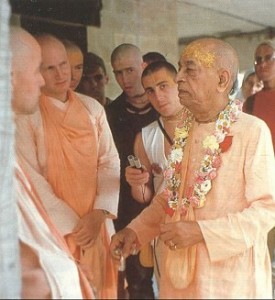
Srila Prabhupada touring his Palace, June 22nd, 1976. (Hari Sauri, the author, holding the microphone.)
Prabhupada was deeply appreciative of their dedication and he expressed this with a quote from the Bhagavad-gita, “Sv-alpam apy asya dharmasya trayate mahato bhayat. Little service in this connection, Krsna consciousness, can protect one from the greatest danger.”
“You are so kind to let us do it,” Kirtanananda Swami submitted.
“Hare Krsna. Krsna’s desire,” Srila Prabhupada said, humbly accepting their offering.
Kirtanananda invited him to visit another building further down the road where many of the fittings are being made. As he got into the car Prabhupada turned to the devotees and said, “Thank you very much.”
The men all broke out in big smiles and cheered. “Srila Prabhupada ki jaya! Srila Prabhupada ki jaya! Srila Prabhupada ki jaya!”
Further down the road we parked in front of a large grey house. Inside Kirtanananda Maharaja showed samples of the accoutrements that will be installed for Prabhupada’s exclusive use in the palace — a large marble latrine, a marble wash basin with twenty-four carat gold fittings and rose quartz handles, carved wooden doors with colored glass set in lead, and many other items created and crafted by the New Vrindaban devotees.
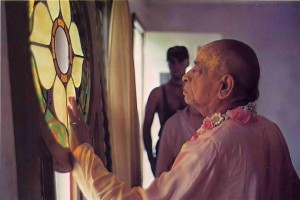
At a New Vrindavan construction site, Srila Prabhupada looks at a stained glass window – June 22nd, 1976.
Their efforts were very satisfying to Srila Prabhupada because, as he said, they are trying to please their spiritual master. When Kirtanananda remarked that they actually did not have any idea how to do any of it, Prabhupada replied that they were working with the special inspiration of God. “‘Do like this.’ Buddhi-yogam dadami tam yena mam upayanti te. If one is sincere to serve the Lord, the Lord is situated in everyone’s heart, He’ll give him, ‘Do like this.’ It is special favor of God. Even if he’s less aware of everything to be arranged, He’ll give instruction, ‘Do like this.’ So there is no scarcity of instruction if one is sincere. Thank you very much.”
As he left the house he delighted the devotees by using himself as an example of one who has received similar help. “I came to your country for preaching this, I had no idea how to do it.” He laughed. “But people are surprised how within so many short years this world movement has sprung. I had no idea how to do it.”
As we drove back to our residence Kirtanananda Maharaja pointed out some land they are gradually clearing. He said it was slow work, because they want to utilize the wood as they cut it and not waste any. Prabhupada approved. “Yes. Unnecessarily you should not cut. When it is necessary for Krsna, then you cut. This is also living entity. We cannot kill them without any sufficient reason.”
On his return to the house, Prabhupada decided to sit in the garden for a while. He doesn’t miss anything. Just behind and to the side of the vyasasana, tulasi plants are being kept in a plastic-sheeted greenhouse. He had seen one of the ladies tending tulasi-devi in the morning. Now, as he entered the garden he commented that she was looking after tulasi-devi very nicely. He is always appreciative of service rendered, whether big or small, and is always ready to give recognition to those who render it.
He was reluctant to take his own seat until he saw that all the devotees also had mats to sit on. As he relaxed against the padded back of his vyasasana, hand in bead bag, fifteen or twenty devotees gathered in a semicircle on the grass in front of him. He told Kirtanananda that many visitors would come to see the palace and that New Vrindaban should simply advertise, “Come and see palaces in New Vrindaban.” He noted that it will be “a combination of Eastern and Western culture for the profit of the whole human society.”
By this time it was about six o’clock in the evening. The sun’s effulgent rays formed speckled patterns as they filtered through the leaves and branches of the trees, alighting on the golden fabric of the vyasasana and complimenting the transcendental radiance of His Divine Grace. Varieties of birds sang and chirped, adding to the comfortable ambiance of a warm summer evening. It was an idyllic setting for the ideal way to spend one’s valuable time-sitting at the lotus feet of the Lord’s pure devotee, receiving nectar from his lotus lips.
Kirtanananda Maharaja told Srila Prabhupada, “We would like to install your murti in that temple.”
Prabhupada humbly responded. “Yasya deve para bhaktir yatha deve tatha gurau. The Vedic secret is that — unto the Lord, similarly, to the guru — to them [who surrender to these two], the whole thing becomes revealed automatically. Vedic knowledge is grasped not by erudite scholarship; mundane scholarship has nothing to do. The secret is yasya deve para bhaktir yatha deve tatha gurau. My Guru Maharaja wanted that some books should be published. So I tried my best, and he’s giving success more than expectation. In the history nobody has sold religion, philosophical books in such large quantity.”
“Or quality,” Pusta Krsna added.
“Yes,” Prabhupada acknowledged. “These are all Guru Maharaja’s blessings. Therefore Narottama dasa Thakura is stressing on this point, guru-mukha-padma-vakya, cittete koriya aikya, ar na koriho mane asa [My only wish is to have my consciousness purified by the words emanating from his lotus mouth.] Simply execute that. You’ll get Krsna.”
Prabhupada remained in the garden for a couple of hours. He instigated debate, repeatedly prompting the small gathering of devotees to discuss challenging issues. Heavily criticizing the United Nations as “barking dogs,” he opened the discussion up with a strong declaration that anyone who is not Krsna conscious is either sinful, grossly foolish, lowest of mankind, in illusion or demonic. “This our definition, that anyone who is not Krsna conscious, he’s either in these four groups, bas, final. You just try to prove it. Hmm? Kirtanananda Maharaja? You have any doubt about it?”
Kirtanananda Swami said he had none and Prabhupada asked if any of the others objected. No one did and he then challenged the devotees to defend this strong stance. “Do it very nicely. Push Krsna consciousness movement vigorously. If you keep the people in ignorance like dogs and hogs, what is the value of advancement of knowledge? So many universities? But discuss this point. We don’t find any wrong. Because Krsna said it, then it’s all right. They will say it is too sectarian, that anyone who is not Krsna consciousness, he’s the most miscreant, sinful and ass and lowest of the mankind; he has lost his all knowledge. This is our accusation. Now defend. Any gentleman will protest that ‘I am such a respectable gentleman, and because I do not take to Krsna consciousness, then I’ll fall amidst these groups? What is this?’ They will say. Now you’ll have to prove, that ‘You are not a gentleman.’”
The devotees raised various objections but as always, Srila Prabhupada had irrefutable logic to defeat them. Pusta Krsna Maharaja questioned the idea of “In God We Trust.” If a man clears the land, plants crops, and harvests them by his hard work, how does faith in God have any practical value, he said. Prabhupada refuted this immediately, saying that if God did not supply the ingredients, it would not be possible for the so-called practical man to work. “You are very practical, but where you get the land? Can you manufacture this land? Can you? Then God comes, immediately. Where you get this water? Can you manufacture water? Where you get this air? Can you manufacture? Where you get this fire? Everything, there is God.”
Pusta Krsna suggested that there was no real difference in the practical living of the atheist and that of the religious.
Prabhupada immediately disagreed. Anyone who does not recognize his dependence on God, he said, will have to suffer, just as a criminal is punished for violating the government laws.
Pusta Krsna said that the Christians say that God is very merciful, which implies that even if one doesn’t follow His laws, God will not punish him.
Prabhupada replied with an elaborate explanation of what God’s mercy actually means, showing that it has nothing to do with our estimations. “That mercy depends on Him; you cannot dictate Him. Simply on the basis of ‘God is merciful’ I can do all unlawful things, this is not practical proposal. Merciful means it depends on me. Whether I shall show mercy or I shall be very strong and strict, that is my will, freedom. I may show you mercy, I may not show. You cannot force me, that ‘You must become merciful.’ That is not right.
“When there is sunshine you see the sinful man and the pious man — both enjoy. That is His mercy. When He bestows His mercy, it is for all of them, either you are sinner or you are pious. That is God’s mercy. Just like the cloud when it pours water, it does not make any discrimination. On the sea, there is also rainfall; on the rocks also, there is rainfall. Where is necessity of rainfall on rock? What is the use? There is no use, it is simply waste. So God also wastes: ‘All right, you take. You don’t require; you also take.’ In the ocean there is no need of water, but cloud pours water on the ocean also. Only on the land we can utilize. But God is so merciful, exactly like the rain cloud. He is so merciful, where there is no necessity they are also getting rain, ‘Take rain.’ That is merciful. Without any discrimination, whether you want or not want, ‘Take it.’ That is mercy.”
He said we have to come to appreciate the greatness of God, and he gave a number of practical examples. “God is so powerful, so great, that within a twinkling of, within a few minutes only, immediately He can overcast with cloud and overflood a whole tract of land. You have to understand God’s greatness in that way. If the number of sinful men are great, God immediately starts one war, and within few years, all finished. Russia finished, America finished, everyone. That is greatness of God. In this way try to understand how God is great in every activity. In mercy He’s great, in cruelty He’s great. If He wants to show cruelty, He’s the greatest cruel. No discrimination, all finished. Never mind women, children or cats, dogs — all finished. That is cruelty, greatness of cruelty. Then there is greatness of mercy. So that is greatness. So you study, in God, how great He is.
“At night you have so many lights for illuminating your city, home, and so many electric powerhouse going on; and God is so great that one sun — immediately, all light. There is no need of powerhouse, there is no need of matches, there is no need of this light, that light — take sunlight. That is His greatness. And within a second. When night is going on, we have seen.” Prabhupada tipped his head and gave me a glance. I remembered when we had flown overnight from Singapore to Australia. Srila Prabhupada had watched through the aircraft window as the sun came up over the horizon. It was striking. Within a few moments only we went from darkness to light; the blazing globe seemed to just pop into view.
Prabhupada had called my attention to the phenomenon then and he did so again now. “Immediately sun comes out, all darkness gone. That is His greatness. Do that like that. Then you compete with God. Can you do it? Then how can you avoid God? Rascals only, mudha, naradhama. They cannot appreciate the greatness of God. Mudha, they’re asses. Anyone who does not appreciate the greatness of God, they’re mudha — as good as the ass. And lowest of the mankind, naradhama. And their so-called scientific knowledge, useless. If by so-called scientific knowledge they want to defy God, then they are useless.”
Later in the discussion Prabhupada informed everyone how Harikesa Maharaja was circulating his books through the underground network in East Germany. Prabhupada related his own experience of the oppressive nature of the communist regime. “When I was in Moscow airport, as soon as they found Bhagavad-gita they called police, the customs checking. The foolish man was kind enough, he said, ‘Not serious offense. Don’t send him in the concentration camp.’ They can do. In Russia, even if you are foreigner, they can immediately send you to the concentration. Without any knowledge. They don’t care for your embassy or your … Such a rascal state, there is no civilized method. They send their own men, such an important man like that Khrushchev. He was sent into oblivion; nobody knows where he is. Such a rascal government. Very difficult to live in. Simply under terrorism the government is going on.”
So the question came up about what hope there is for people in countries like Russia and China.
“Everyone will be benefited. Simply you have to preach,” Prabhupada responded. “You have to preach in the same way that where there is no necessity, there also the preaching will go on. You have to become like cloud. Therefore you sing every day, samsara-davanala-lidha-loka-tranaya karunya-ghanaghanatvam. Ghanaghanatvam means deep cloud. You have to become deep cloud and pour water. This blazing fire will be extinguished. When there is blazing fire in the forest, the small fire brigade or bucketful of water will not help. It requires cloud, ghanaghanatvam, to pour water, finished. You have to do like that. Vande guroh sri — one who can do this, he is guru. How one can become so? Praptasya kalyana, one who has received the mercy of the Supreme Lord, he can do it. A cloud is formed by receiving mercy of the ocean. Cloud is never formed by receiving the mercy of tap water. You can say, ‘Here is also water.’ ‘Not that water, the ocean water.’ What you will gain by receiving the mercy of tap water?” he laughed. “We have to receive the mercy of the ocean, gunarnava. Arnava means ocean. So it will be possible. If the cloud is there, bona fide, he can pour water, finish all blazing fire.”
As the conversation progressed, we discussed the idea of knowledge and whether, as some scholars and philosophers say, the pursuit of knowledge alone is enough. Prabhupada gave yet another angle on the same theme of supreme mercy through guru and Krsna. “Any knowledge, if you want to get it, you must receive it from a superior person. That is the law. That I already explained. If you want to steal, if you want to become a thief, you have to learn it from an expert thief. Knowledge means you have to learn it from a superior person. And what to speak of the knowledge of God, that is the ultimate knowledge. Yesterday we were speaking that Kirtanananda Maharaja learned how to make samosas. Now that knowledge is distributed. So every knowledge, you have to learn it from an expert. That is called guru. Guru means expert, heavy, whose knowledge is heavier than your scanty knowledge. You have to learn knowledge. Guru means heavy. Therefore Vedic injunction is abhigacchet; this word is used when the sense is ‘must.’ Not optional, that I may go or I may not go. No, you must. This is Vedic injunction.”
Srila Prabhupada said that any person who desires to know something about any subject, must approach an expert, just as a man who desires a son must have a wife. He cannot do it on his own.
The temple president, Kuladri dasa, questioned him from a slightly different angle. “But Srila Prabhupada, without any desire we have been given the heaviest guru. How is that possible? Without our knowing about Krsna, having any desire to become Krsna conscious, still we have been given the knowledge.”
Prabhupada replied in the same vein as he started the conversation. It wasn’t just a question of what the recipient thinks. “No. Anyone who is Krsna conscious, it is the duty to distribute it. It is his duty. When I came here, I never came here because American boys or people wanted me. They did not feel any need of my presence. But I came here, because it is my duty. My Guru Maharaja ordered me. So one may think there is need or no need — it is the duty of Krsna conscious persons to spread it. Just like the example I have already given. The cloud — the mountain does not want rain, the sea does not want, but the cloud throws water everywhere.”
Another devotee then wondered why, if Prabhupada has so freely given this mercy, some have come and some have not come. What was the difference? “Difference is it is Krsna’s desire,” Prabhupada told us. “He wants that ‘Don’t remain like cats and dogs. Be intelligent and come back to Me.’ Krsna says sarva-dharman parityajya mam ekam saranam vraja. So it is the duty of a devotee of Krsna to spread this knowledge so that they may take to Krsna. The cats and dogs, they cannot understand, but those who are two-legged cats and dogs, they can understand.” He started laughing, smiling with gentle humor. “That is the advantage, because they have got two legs. So long they had four legs they could not understand. So here is a chance, two-legged. So give them some opportunity.”
It was a thoroughly pleasing session, with Srila Prabhupada living out his metaphor of the deep cloud even as he spoke it. Everyone was invigorated and inspired, ready recipients of as much mercy as Srila Prabhupada wanted to shower on their heads.
Finally he brought the darsana to an end. He retired to his room for a cup of hot milk fresh from the cows, his evening massage and a little rest, before opening up the flood gates of his beneficence once more — this time to the entire world — through the pages of the Srimad-Bhagavatam.
 Sri Caitanya Mahaprabhu asked, "Where should the living entity live, abandoning all other places?"
Ramananda Raya replied, "The holy place known as Vrndavana or Vrajabhumi, where the Lord performed His rasa dance."
Sri Caitanya Mahaprabhu asked, "Where should the living entity live, abandoning all other places?"
Ramananda Raya replied, "The holy place known as Vrndavana or Vrajabhumi, where the Lord performed His rasa dance." 
 New Vraja Mandala is located in Brihuega, dist. Guadalara, central Spain at a distance of about 85km. from the Madrid airport. The property consists of ancient aristocratic buildings and about 300 hectares of land. It has been acquired by ISKCON in 1979 and houses the temple of Sri Sri Radha Govinda Chandra - See more at: http://www.iskconcenters.com/brihuega-new-vraja-mandala/#sthash.1OPcpBnX.dpuf
New Vraja Mandala is located in Brihuega, dist. Guadalara, central Spain at a distance of about 85km. from the Madrid airport. The property consists of ancient aristocratic buildings and about 300 hectares of land. It has been acquired by ISKCON in 1979 and houses the temple of Sri Sri Radha Govinda Chandra - See more at: http://www.iskconcenters.com/brihuega-new-vraja-mandala/#sthash.1OPcpBnX.dpuf  “Temple means free Prasadam distribution! No one should go hungry within ten miles from the temple. Start free food distribution for these people!”
Since then, free Prasad distribution has been going on at every ISKCON temple worldwide, especially at Vrindavan and Mayapur.
“Temple means free Prasadam distribution! No one should go hungry within ten miles from the temple. Start free food distribution for these people!”
Since then, free Prasad distribution has been going on at every ISKCON temple worldwide, especially at Vrindavan and Mayapur. 




 Please write your well-wishes and your prayers and send them via email. I will deliver your offerings a.s.a.p.
Please write your well-wishes and your prayers and send them via email. I will deliver your offerings a.s.a.p. 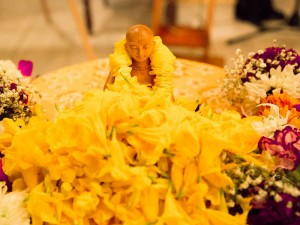
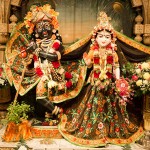
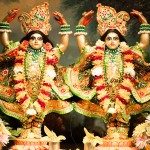
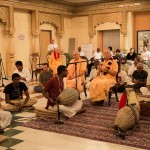
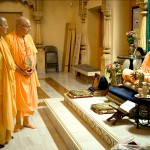

 Indradyumna Swami: At the Bhakti Sangam Festival in Ukraine 11,000 devotees had breakfast and lunch each day. The 22,000 plates were prepared by dedicated teams of devotees, sometimes working even in the rain
Indradyumna Swami: At the Bhakti Sangam Festival in Ukraine 11,000 devotees had breakfast and lunch each day. The 22,000 plates were prepared by dedicated teams of devotees, sometimes working even in the rain 
 In 1966, Srila Prabhupada began chanting the Hare Krsna mahamantra under a tree in New York's Tompkins Square Park, thereby inaugurating the western advance of Lord Caitanya Mahaprabhu's glorious Sankirtana movement.
In 1966, Srila Prabhupada began chanting the Hare Krsna mahamantra under a tree in New York's Tompkins Square Park, thereby inaugurating the western advance of Lord Caitanya Mahaprabhu's glorious Sankirtana movement.  The long-running feud over Moscow’s ISKCON temple shows the suspicion and hostility that the Hare Krishna movement, legalised in Russia in 1988, still evokes in that country
The long-running feud over Moscow’s ISKCON temple shows the suspicion and hostility that the Hare Krishna movement, legalised in Russia in 1988, still evokes in that country  The temple has 50 ropanies of land including temple, guest house, garden, gausala, restaurant etc. The temple is about a ten-minute walk from the Budhanilkantha Temple, in a beautiful rural setting. Buses to Budhanilkantha (8 km) depart from Rani Pokhari and Kalanki in Kathmandu, every half-hour
The temple has 50 ropanies of land including temple, guest house, garden, gausala, restaurant etc. The temple is about a ten-minute walk from the Budhanilkantha Temple, in a beautiful rural setting. Buses to Budhanilkantha (8 km) depart from Rani Pokhari and Kalanki in Kathmandu, every half-hour  Talavan is one of the twelve forests around Vrndavana, a city in India where Krishna incarnated 5,000 years ago. Krishna and His cowherd friends would go there and play, rest, eat and watch their cows as they grazed.
Talavan is one of the twelve forests around Vrndavana, a city in India where Krishna incarnated 5,000 years ago. Krishna and His cowherd friends would go there and play, rest, eat and watch their cows as they grazed.  We even remember Radhapati prabhu as the sole man down in the BBT Mail Order "cave", we used to call it, in the garage under the green bldg of New Dwaraka. EVERYDAY...rain or shine...ALL BY HIMSELF, he would fill the orders from all over the world for PRABHUPADA's BOOKs and send them out to the respective Temples
We even remember Radhapati prabhu as the sole man down in the BBT Mail Order "cave", we used to call it, in the garage under the green bldg of New Dwaraka. EVERYDAY...rain or shine...ALL BY HIMSELF, he would fill the orders from all over the world for PRABHUPADA's BOOKs and send them out to the respective Temples